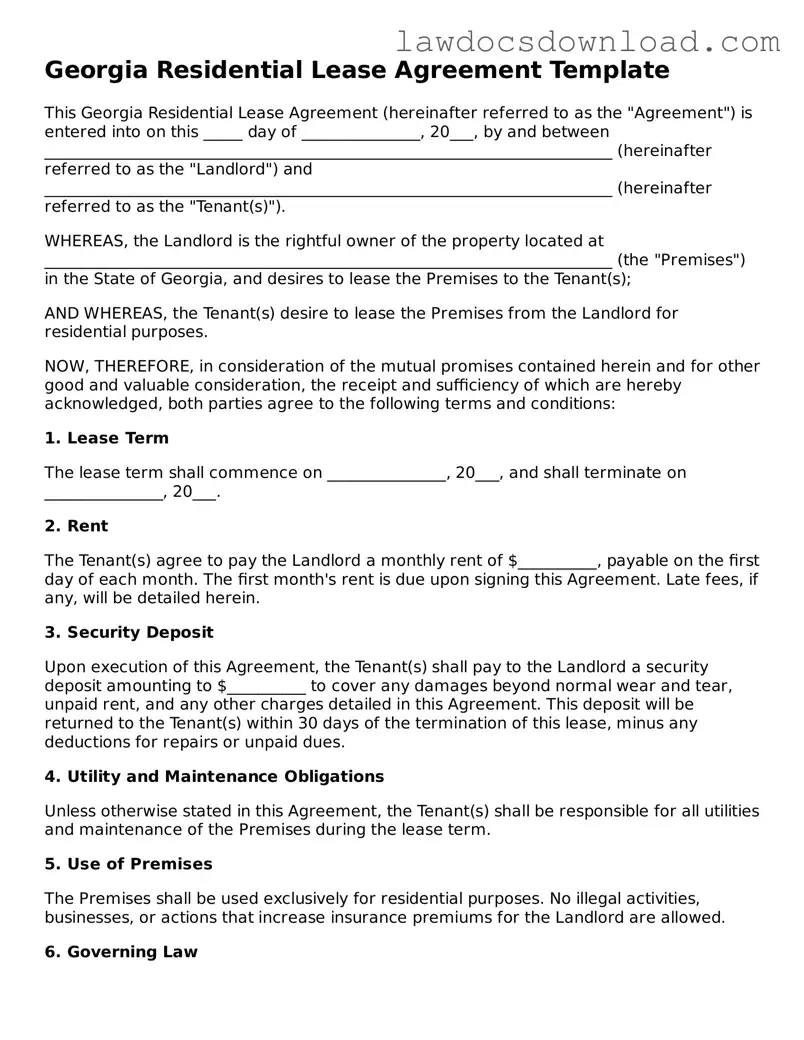Georgia Residential Lease Agreement Template
This Georgia Residential Lease Agreement (hereinafter referred to as the "Agreement") is entered into on this _____ day of _______________, 20___, by and between ________________________________________________________________________ (hereinafter referred to as the "Landlord") and ________________________________________________________________________ (hereinafter referred to as the "Tenant(s)").
WHEREAS, the Landlord is the rightful owner of the property located at ________________________________________________________________________ (the "Premises") in the State of Georgia, and desires to lease the Premises to the Tenant(s);
AND WHEREAS, the Tenant(s) desire to lease the Premises from the Landlord for residential purposes.
NOW, THEREFORE, in consideration of the mutual promises contained herein and for other good and valuable consideration, the receipt and sufficiency of which are hereby acknowledged, both parties agree to the following terms and conditions:
1. Lease Term
The lease term shall commence on _______________, 20___, and shall terminate on _______________, 20___.
2. Rent
The Tenant(s) agree to pay the Landlord a monthly rent of $__________, payable on the first day of each month. The first month's rent is due upon signing this Agreement. Late fees, if any, will be detailed herein.
3. Security Deposit
Upon execution of this Agreement, the Tenant(s) shall pay to the Landlord a security deposit amounting to $__________ to cover any damages beyond normal wear and tear, unpaid rent, and any other charges detailed in this Agreement. This deposit will be returned to the Tenant(s) within 30 days of the termination of this lease, minus any deductions for repairs or unpaid dues.
4. Utility and Maintenance Obligations
Unless otherwise stated in this Agreement, the Tenant(s) shall be responsible for all utilities and maintenance of the Premises during the lease term.
5. Use of Premises
The Premises shall be used exclusively for residential purposes. No illegal activities, businesses, or actions that increase insurance premiums for the Landlord are allowed.
6. Governing Law
This Agreement shall be governed by and construed in accordance with the laws of the State of Georgia.
7. Amendments
This Agreement may only be amended in writing, signed by both parties.
8. Notices
All notices under this agreement must be given in writing and shall be effective when delivered personally or sent by registered or certified mail to the following addresses:
- Landlord: ________________________________________________________________________
- Tenant(s): ________________________________________________________________________
9. Entire Agreement
This document and any attached addenda constitute the entire agreement between the parties and supersede any previous understanding or agreement between them.
IN WITNESS WHEREOF, the parties have executed this agreement on the date first above written.
Landlord Signature: ______________________________________ Date: ________________________
Tenant(s) Signature: _____________________________________ Date: ________________________

